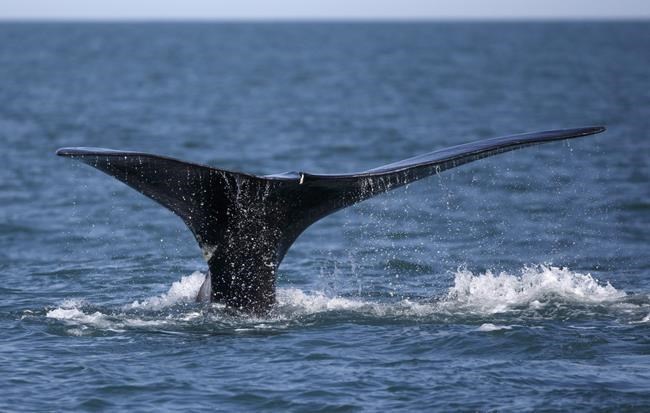HALIFAX — A conservation group trying to prevent ships from striking endangered whales in the Gulf of St. Lawrence says new satellite data indicates that vessels transiting the Cabot Strait are routinely ignoring voluntary speed limits.
Oceana Canada released the figures Thursday and called on Ottawa to impose mandatory speed limits to protect the dwindling number of North Atlantic right whales, which started arriving in the gulf last month as part of their spring migration.
But the federal Transport Department and a group that represents the shipping industry are challenging the numbers, saying they don't reflect what is really happening on the water.
Oceana, an independent advocacy group, says that for the second year in a row, it found that a majority of vessels sailing through the strait exceeded the 10-knot voluntary speed limit during the first week it was in effect.
"It's kind of a no-brainer, but voluntary measures tend to be not as effective as mandatory measures," Kim Elmslie, campaign director for Oceana Canada, said in an interview Wednesday.
"We really want (Transport Canada) to take that next step … It needs to be mandatory."
Since June 2017, an unusually large number of North Atlantic right whales have died, reducing the population to fewer than 400 animals — a number that has some experts warning that the whales are on the brink of extinction.
Ship strikes and fishing gear entanglements account for most right whale deaths.
In the past four years, the Canadian government has imposed a series of measures to protect the whales, including periodic fisheries closures and mandatory speed limits that apply to much of the gulf — but not the Cabot Strait.
At least 34 North Atlantic right whales died between 2017 and 2021 — 21 of them in Canadian waters.
Using data from Global Fishing Watch, a public satellite tracking website, Oceana found that 64 per cent of transits through the strait — 65 out of 101, involving 58 vessels — failed to comply with the voluntary slowdown rules from April 28 to May 4. And the highest observed speed was 17.4 knots.
Elmslie said the findings represent a worse result than last year, the first year of the voluntary pilot program. During the same week in 2020, 55 per cent of transits did not comply with the limit, Oceana said.
Elmslie cited an April 2013 study that found slowing vessel speeds to 10 knots or less can reduce the lethality of a collision with a right whale by up to 90 per cent. The U.S. study was prepared by the National Oceanic and Atmospheric Administration and published in the journal Ecosphere.
Transport Canada issued a statement Wednesday disputing Oceana's claims.
The federal department said its satellite data shows that during the week cited by Oceana, 46.5 per cent of vessels transiting the Cabot Strait had exceeded the speed limit, well below the 64 per cent reported by Oceana.
As well, the federal department said that during the first three weeks of the 2021 season, 52.4 per cent of vessels were respecting the limit, compared with 46.3 per cent during the first three weeks of the 2020 season.
The department said its data from the Canadian Coast Guard provides greater accuracy than the publicly available data sources used by Oceana. And it stressed that Oceana's figures did not take into account that, for navigational safety reasons, all speed limits are lifted when there is bad weather.
"The Oceana approach does not account for reasons why a vessel may not have been able to participate, for example when weather, safety, vessel timetables, logistics, delivery schedules, contractual obligations, etc. may not have allowed for participation," the statement said.
"The decision to move the Cabot Strait slowdown from voluntary to mandatory will require evaluating more than just participation rates."
Still, Elmslie argued that a participation rate of just over 50 per cent is nothing to brag about.
As for those areas that have mandatory speed limits, Transport Canada confirmed that during the 2020 season, there was a 99.9 compliance rate in those zones, where 8,784 vessel movements were tracked. Seven fines were issued to speeding vessels.
Since the start of the 2021 season, of the 1,235 vessels movements tracked in the gulf, 79 were recorded above 10.0 knots, and five fines are under review, the department said Thursday.
Michael Broad, president of the Shipping Federation of Canada, said the coast guard numbers make it clear cargo ship captains are doing their best to comply with the voluntary limit.
"Overall, the industry has shown a tremendous commitment to protecting the whales," Broad said in an interview.
"This is an expensive and complicated slowdown … When bad weather comes in, the ships can't always keep to that slowdown limit. To steer the ship in bad weather and to keep things on an even keel, you often have to increase speed."
The federation represents ship owners, operators and agents who work for more than 200 shipping lines around the world.
"Not everybody is participating, but most want to participate," Broad said. "And the Transport Canada numbers show an increase in participation."
The voluntary limit, which applies to vessels over 13 metres, was to remain in place this year from April 28 to June 29 and from Sept. 29 to Nov. 15, 2021.
This report by The Canadian Press was first published May 27, 2021.
Michael MacDonald, The Canadian Press



